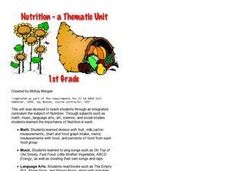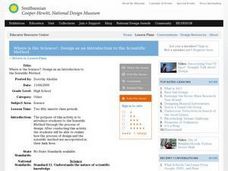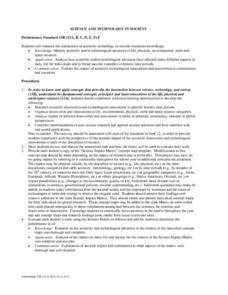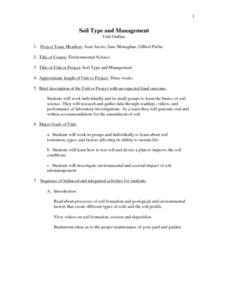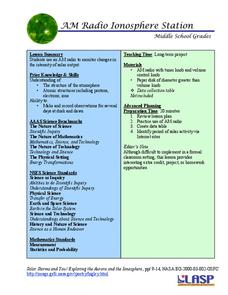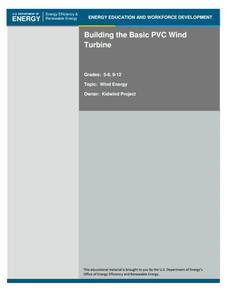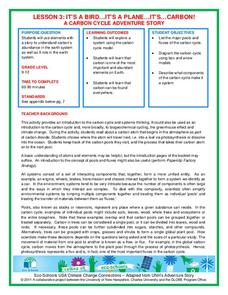Curated OER
Nutrition: A Thematic Unit
Young learners explore nutrition and the food groups in these two mini-lesson plan ideas. First, kindergarteners have a discussion about their health and how different foods contribute to it before making their own personal food pyramid....
Curated OER
Where is the Science?: Design as an Introduction to the Scientific Method
High schoolers work to create a design that will protect an egg from being dropped from a one story floor. They test their prototype after it is completed. They write clear instructions and link aspects of the design process to the...
Curated OER
SCIENCE AND TECHNOLOGY IN SOCIETY
Students research scientific discoveries and technological innovations. They organize discoveries and innovations in life, environmental, physical, earth and space science categories. They analyze impact of selected discoveries and...
Curated OER
Soil Type and Management
Young scholars study the basics of soil science. They research and gather data through readings, videos, and performance of laboratory investigations. As a team they generate oral and written recommendations for the amendment of soil.
PHET
AM Radio Ionosphere Station
Tune in! Young scientists use an AM radio at home to monitor solar output. The long-term project would be ideal in a flipped classroom or as an out-of-class project.
US Department of Energy
Building the Basic PVC Wind Turbine
Here is a comprehensive and well-written lesson plan that results in learners building a standard wind turbine. Once built, teens can design a variety of experiments to test different factors. This activity is a noble undertaking that...
Curated OER
Ready-Set-Tech: When a Volcano Erupts
Wouldn't it be a blast to uncover the science behind volcanic eruptions? Explore, research, and examine the nature of volcanoes with three fun hands-on projects kids will love. First the class takes to the Internet to research volcanoes....
Polar Trec
Touring the Poles
Would you want to vacation in the Arctic or Antarctic regions? Scholars research both regions and produce a travel brochure trying to convince tourists to visit. The project focuses on the geography, climate, flora, fauna, and indigenous...
Baylor College
Gases Matter
As a demonstration or as a hands-on activity, your class watches as the combination of vinegar and baking soda produce carbon dioxide gas. The intent of the lesson is to help youngsters understand that gases occupy space. It is included...
Curated OER
WET Science Lesson #5: Pass the Salt Please! (How Road Salt Affects Wetlands)
As an anticipatory set, biologists listen to the story of Ruth Patrick, a scientist who used algae to detect water quality. They observe a demonstration of osmosis and diffusion. In their lab groups, they place Elodea stalks in...
Curated OER
Just Plain Buggy: Art and Science
Budding artists explore the shapes and parts that make insects so fascinating to study, then use what they see to create original insect inspired designs. They use wax, dye, and fabric to create their designs.
Berkshire Museum
Adopt a Schoolyard Tree
Help young scientists connect with nature and learn about trees with a fun life science lesson plan. Heading out into the school yard, children choose a tree to adopt, taking measurements, writing descriptions, and drawing sketches of it...
Polar Trec
Do Microorganisms Live in Antarctica?
Can microorganisms live in the dry, cold climate of Antarctica? Young scientists view a research project measuring microorganisms in the Taylor Glacier. They record the findings from dirty ice, clean ice, boots, sediment, and more. Then...
Baylor College
It Begins with the Heart
Aspiring anatomists label a photograph of a human heart by comparing it to a colored diagram on the same page. The video that is mentioned in the procedure does not seem to be available, but the overview provides plentiful background...
NASA
Let's Investigate Mars
Take your science class on a hypothetical field trip to Mars with an engaging astronomy lesson. After first learning about NASA's Mars rover missions, young scientists plan their own scientific investigations of Earth's nearest neighbor.
Curated OER
Fracking: Positive or Negative Impact?
Your teenagers may have heard of fracking, but do they really know what it is? And could they debate the benefits and risks? Educate your environmental science class with a activity about hydraulic fracturing, non-renewable energy...
Baylor College
Microbes and Disease
Discuss how diseases have impacted human history. Divide your class into groups and assign each group one of the following: tuberculosis, malaria, plague, cholera, smallpox, and AIDS. They read up on, complete a concept map, and present...
Berkshire Museum
Camouflage!: Collecting Data and Concealing Color
Help young scholars see the important role camouflage plays in the survival of animals with a fun science lesson. Starting with an outdoor activity, children take on the role of hungry birds as they search for worms represented by...
American Forest Foundation
Who Speaks for the Trees?
Help young conservationists appreciate the important role that trees play in ecosystems around the world with this collection of six engaging activities. From a shared reading and class discussion of Dr. Seuss' The Lorax, to in an depth...
National Wildlife Federation
What's Your Habitat?
How are third graders like rabbits? They both live in habitats and require food, water, and shelter to survive! An educational science instructional activity encourages your learners to think about their own habitats and survival needs,...
ARKive
Species Discovery
How do you classify a newly discovered species? Learners view a presentation and complete research about biodiversity and the classification hierarchy. The lesson includes activities with dichotomous keys and work on classifying both...
National Institute of Environmental Health Sciences
A Student Exploration of the Impacts of Climate Change on Human Health in the United States
Let the data drive the science. Learners examine data provided in resources to discover connections between climate change and health of vulnerable populations. They study trends and present findings using their choice of projects.
Curated OER
Designing a Crew Exploration Vehicle
Take your class on an out-of-this-world adventure with this fun engineering design activity. Working in small groups, young scientists design, build, and test crew exploration vehicles using some creativity, teamwork, and an assortment...
National Wildlife Federation
It's A Bird...It's A Plane...It's...CARBON!
An interesting lesson takes pupils on a trip through the carbon cycle. A reading passage allows scholars to take notes and make choices about what happens to the carbon on its journey. This third lesson in a series of 21 discusses...
Other popular searches
- 4th Grade Science Project
- Physical Science Projects
- Science Project on Pulleys
- Science Project Volcano
- Science Project Gravity
- Science Project Ideas
- Forensic Science Project
- Science Fair Project Ideas
- Rock Science Project
- Science Project Food
- Science Project Terrarium
- Science Fair Project Data


